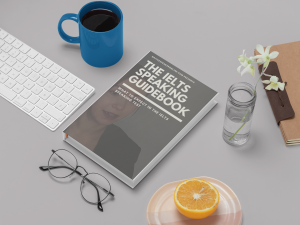In today’s tip, we are going to watch a video of the IELTS Speaking test. The video shows the complete test — Part 1, Part 2 and Part 3. If you have not taken the test before, this video will give you a clear idea of the type of questions and tasks that you will get. This candidate’s score was probably around 5-5.5, which is a little lower than most people’s target band. Below the video, I will explain how the candidate could improve his score.
What does he do well?
Firstly, let’s look at the positive points.
- He listens to the questions and if he doesn’t understand, he asks the examiner to repeat. The examiner is allowed to repeat question, so don’t be afraid to ask!
- He corrects some of his mistakes (for example at 02:40).
- He makes eye contact with the examiner.
- He always has something to say.
- He uses some collocations correctly, for example do karate (2:04).
What mistakes does he make?
This candidate is obviously a little nervous, probably because of the camera, so he probably made more mistakes than usual. But anyway, let’s look at a few of his errors.
Vocabulary mistakes
He makes a lot of simple vocabulary mistakes and often confuses verbs, adjectives and nouns. A few examples:
- He says *stressful* (2:59) instead of stressed.
- He says *enjoying* (3:10) instead of enjoyable.
- He says *enjoy* (4:52) instead of enjoyable.
- He says *advertise* (11:42) instead of advertisement.
He makes a lot of mistakes with prepositions, for example:
- He says *good in mathematics* (0:53) instead of good at mathematics.
- He says *spend money for* (9:46) instead of spend money on.
He also uses a lot of simple words and expressions because he does not know enough vocabulary. For example, in Part 2, he describes rings as complicated and simple. It would be better to say something like: Some rings were too flashy (or extravagant), but other rings were too plain (or ordinary/boring).
Grammar mistakes
He makes a lot of simple grammar mistakes. Most of these mistakes are typical among many Band 5-5.5 IELTS candidates. For example:
- He uses the past simple (I worked – 0:42) instead of the present perfect (I’ve been working for 7 years).
- He says *I will meet* instead of I’m going to meet (we use going to when talking about our intentions for the future).
- He often forgets the -s in the third person singular, for example *she help me* (2:43) instead of she helps me.
- He says some in a negative sentence (10:53), instead of any.
- He doubles the subject of the sentence a lot, for example *live music, it’s better* (4:40) instead of live music is better.
How can he improve his speaking?
If Brahim wants to achieve higher than 6 next time, it will not be easy. However, it is not an impossible task. Here are some quick preparation tips if you are at a similar level to Brahim:
- Listen to as much English as possible (films, TV shows, documentaries, etc.)
- Practise speaking with proficient English speakers, whenever possible.
- Try to think in English as much as possible.
- Improve your vocabulary for talking about every day topics. Buy a good vocabulary book or get my Vocabulary for Part 2 eBook.
- Become aware of your typical mistakes. Ask a fluent English speaker to correct your mistakes and write down the correct sentences.
- Try to control your nerves — get a good night’s sleep before the test and consider doing some physical exercise before you leave home.
- Don’t make your answers too ambitious. If you feel uncomfortable using a certain structure, word or strategy, don’t use it! For example, in my IELTS Speaking Tips eBook I present lots of questions you can use to ask the examiner to repeat something like: Sorry, I didn’t catch that. Could you repeat it?
However, if you are nervous and don’t feel comfortable, you can simply say Sorry? - Finally, read all the general tips in this blog!

This FREE eBook Shows You What Kinds of Tasks and Questions to Expect in the IELTS Speaking Test.
Great blog post! It provided so many helpful tips and tricks on how to impress the IELTS speaking examiner. Especially the reminder to avoid memorizing answers and using big, unfamiliar words.